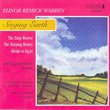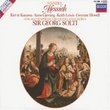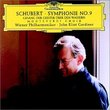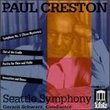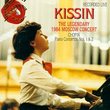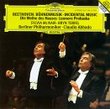| All Artists: Granville Bantock, Vernon Handley, Royal Philharmonic Orchestra Title: Bantock: Pagan Symphony / Handley Members Wishing: 0 Total Copies: 0 Label: Hyperion UK Release Date: 4/16/1995 Album Type: Import Genre: Classical Styles: Forms & Genres, Theatrical, Incidental & Program Music, Symphonies Number of Discs: 1 SwapaCD Credits: 1 UPC: 034571166308 |
Search - Granville Bantock, Vernon Handley, Royal Philharmonic Orchestra :: Bantock: Pagan Symphony / Handley
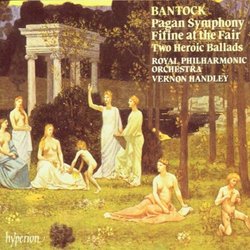 | Granville Bantock, Vernon Handley, Royal Philharmonic Orchestra Bantock: Pagan Symphony / Handley Genre: Classical
|
Larger Image |
CD DetailsSimilarly Requested CDs |
CD ReviewsBantock's 'Pagan Symphony';'Fifine at the Fair'; Two ballads K. Farrington | Missegre, France | 02/25/2000 (5 out of 5 stars) "Here Bantock is not referring to the 'New Age' Pagans we see today, with joss sticks and crystals but here he alludes to one of his first loves, Classical Antiquity. He prefixes his Pagan Symphony with the Latin motto 'Et ego in arcadia vixi' which means 'I too lived on Arcadia' and attempts to portray through the eyes of a Victorian intellectual those idealised visions of nymphs and gods and goddesses living in a pastoral landscape of divine beauty. Today we have lost this false picture due to the work of Nietzsche and other scholars who have penetrated further into the Greek ideals than did the 19th century philhellenes. However, we can appreciate this work as late romantic invention rather than musical archaeology. The vehicle Bantock uses is the late romantic post-Wagnerian orchestra that Richard Strauss had taken into new sound worlds with his tone poems like 'Also Sprach Zarathustra' and 'Till Eulenspiegel'. All this stuff must have been so exciting when it was cutting edge and Bantock was not alone when he was attempting to conjure up the world with a 120 piece orchestra and the new chromatic, flowing never-ending melodies he had inherited from Wagner. The brilliant orchestration with growling brass, jumping woodwind and finely divided strings represents romantic music on the very precipice with Mahler's doom laden appogiaturas. Unlike Mahler, however, Bantock is good humoured and does not seek like Scriabin to explode in an apotheosis of sexual-religious ecstasy or retreat like Debussy into a world of sense experience robbed of action or like Delius inhabit a world of contemplative hedonism. He is thus remarkably well balanced as a composer, lacking that self-indulgent 'suffering for his art philosophy' that became so associated for a time with the romantic creative artist like its non plus ultra, Baudelaire or even Chatterton and Byron. In true English vein, he shows his genius in plain speaking terms yet the orchestra sparkles as much as with his (more frequently played) contemporaries. He is a Tennyson of music and not a Mallarme. Fifine at the Fair is a tone poem based on a poem by Browning which is almost incomprehensible to modern sensibilities but involves something a butterfly symbol on the sea of life and infatuation of the protagonist with Fifine, a dancer at a fairground, all to the detriment of his marriage to his wife, Elvire. The lesson is learned, he is forgiven by Elvire, and all ends well. The music was championed by Beecham for a while as it puts the orchestra through its paces with immense tutti and solo opportunities for many players; in effect it should be a Proms favourite, although I cannot recall it being played there. Anyone who likes this period's music will adore this work and will cherish the lingering ending with its plaintive tune. The 'Ballads' are equally fine. This CD sits almost permanently on my CD changer. Every time I play it, new features come out to my attention. Handley takes it all very seriously, as he should, and shows again the depth of musical talent that England possessed at this time. Great!" ...Wildly imagative David | Spruce Grove, AB Canada | 08/17/2002 (5 out of 5 stars) "To the thanks of Vernon Handley and Hyperion records, Granville Bantock can be appreciated after being neglected for a long time. When it comes to British composers there was never that much focus put upon Bantock, although he has at times been compared to Edward Elgar...a unlikely comparison, Liszt, Wagner and Richard Strauss come more in mind.Granville's fascination with celtic mythology is never more evident with the likes of "Pagan Symphony" 35 minutes of one continous movement that fall into sections, music of the highest imagination that invokes the mind. Bantock derives most of his works from poetic references."Fifine At The Fair" being his most popular performed work being no exception, has Robert Browning as the influence...which at the time was considered unreadable."Two Heroic Ballads", Cuchullan's Lament and Kishmul's Galley are both based upon Kennedy-Fraser collection of songs. Kismul's Galley had been lifted from "Hebridean Symphony".Vernon Handley and the Royal Philharmonic Orchestra are just simply marvelous, the colourful sweeping orchestration carries you off to another place and time." MUSIC OF STORY AND VISION NotATameLion | Michigan | 10/18/2003 (4 out of 5 stars) "Somewhere in between aching loveliness and the blaringly brash Granville Bantock's music achieves greatness. Bantock's inventiveness and vision rivals that of contemporaries like Holst and even Vaughan Williams (a personal favorite of mine). This recording--containing the massive one movement Pagan Symphony, the lovely Fifnie at the Fair, and two impressive heroic ballads--serves as a great introduction to this composer. The Pagan Symphony centers on Bantock's ideas about classical Greece. In musical form he alludes to and brings to life the culture and legends of the Greeks. Fifnie at the Fair was inspired by a Robert Browning poem. It is the most stunningly beautiful piece on the disc. It is almost a necessary counterweight to the thunder of the Pagan Symphony. The two ballads--Cuchullan's Lament & Kishmul's Galley are more than just filler pieces. Each has a charm and character distinctly its own.Bantock the composer may not have been a world class lyricist, but he could tell quite a story. His music is full of color. He used a full palate to paint soundscapes that are uniquely wonderful.Vernon Handley, the Royal Philharmonic Orchestra and Hyperion's engineers are to be given full credit for this wonderful recording. I must say this also about Handley and Hyperion--with their work on the Robert Simpson Symphony cycle and now with this disc and their other recordings of Bantock's music--they are not just making great music but leaving a legacy.I give this disc my full recommendation"
|

 Track Listings (13) - Disc #1
Track Listings (13) - Disc #1